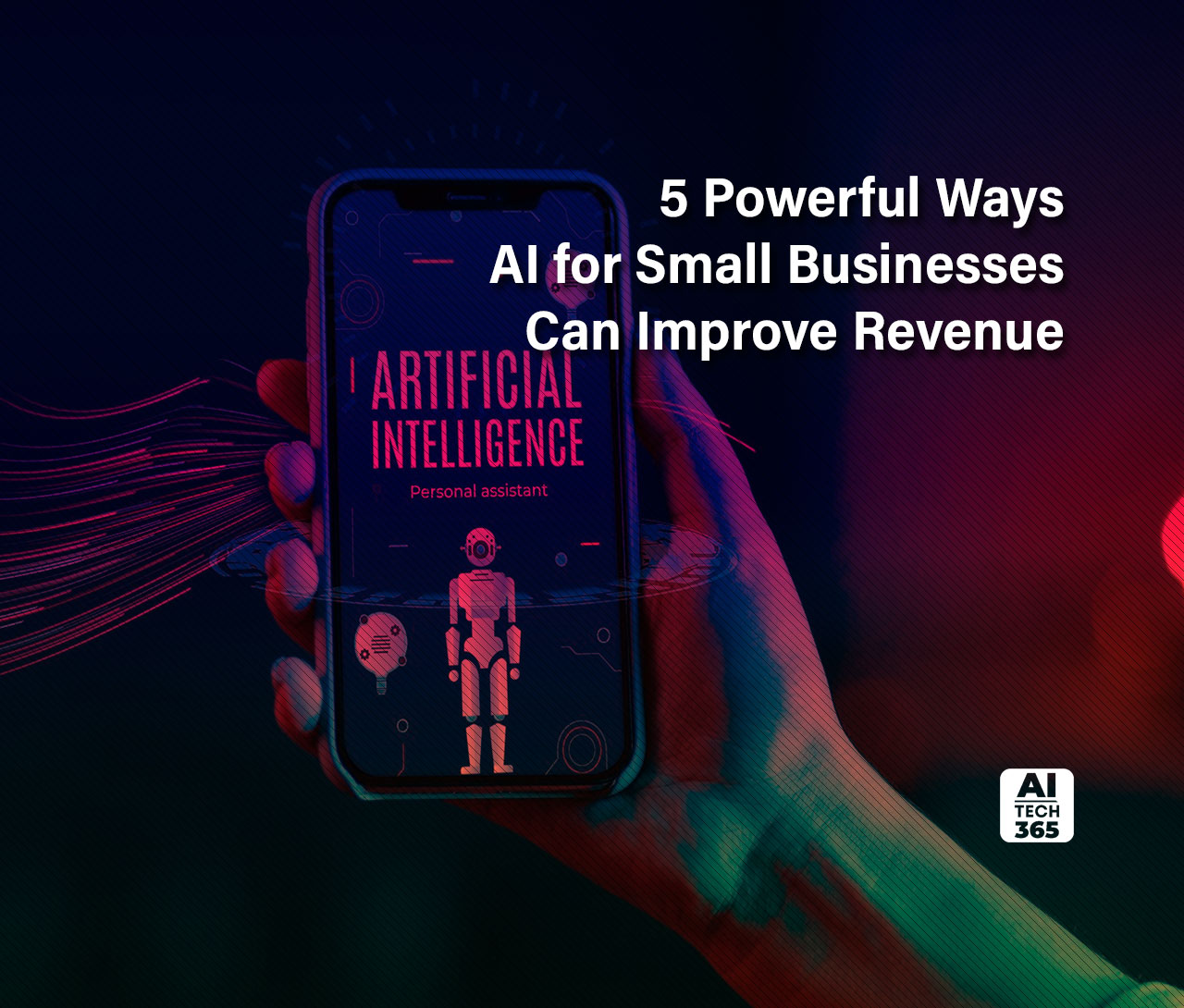While many business owners are still exploring the implications of artificial intelligence (AI), a recent report from the Small Business and Entrepreneurship Council (SBEC) indicates that a significant portion of small businesses are leveraging AI tools to enhance efficiency, resulting in substantial annual cost savings. According to a survey by the SBEC, nearly half (48%) small businesses adopted AI tools in the past year, with 29% having utilized them for one to two years. Let’s get started and understand everything about how AI for small businesses can enhance efficiency and profits.
5 Powerful Ways AI for Small Businesses Can Improve Revenue
Discussed below are five ways AI improves revenue, along with the best AI tools for small businesses.
1. Automating Customer Service with Chatbots
Chatbots have gained popularity for their ability to mimic human-like conversations and perform routine tasks, reducing wait times and cutting staffing costs. AI for small businesses can leverage chatbot platforms like ChatGPT to deliver prompt and seamless customer service. These platforms use natural language processing to recognize and respond to customer inquiries effectively, ensuring personalized attention and improving overall satisfaction.
2. Personalizing Customer Attention with Natural Language Processing
AI-powered chatbot platforms can continuously learn from customer interactions, improving their accuracy and effectiveness over time. By analyzing customer data, including behavior, preferences, and demographics, small businesses can create personalized marketing messages that resonate with individual customers. AI algorithms can also offer personalized content recommendations based on a user’s history, similar to a streaming TV service. This level of personalization helps build stronger connections with customers and increases brand loyalty.
3. Streamlining Customer Service through Automation
Another method of using AI for customer service is automation. Automating routine tasks such as order confirmations and support ticket follow-ups enables businesses to maintain consistent and timely communication, resulting in significant time and cost savings. Integrating certain automation technologies with programs like customer relationship management (CRM) software enhances workflow efficiency, creating a more streamlined and effective operational process.
4. Personalized Marketing Campaigns with AI
AI for small businesses can harness the power of innovative technologies to create personalized marketing campaigns. By collecting and analyzing customer data, businesses can develop customer segments and send targeted marketing messages, including email campaigns, social media ads, and other tailored content. AI tools like ChatGPT, Adobe Firefly, and Pictory can analyze data about content performance and suggest topics and headlines that resonate with specific audiences.
5. Optimizing Content Creation with AI
AI-powered tools can analyze data to determine which types of content perform best with specific audiences, suggesting topics and headlines based on that data. These tools can even generate content, such as product descriptions, news articles, and multimedia content like photos and videos. However, businesses should ensure that the content aligns with their brand voice and messaging to maintain quality and authenticity.
What is the Potential of AI for Small Businesses?
Adopting AI technology can benefit small firms greatly. Businesses may provide quicker and more effective customer support by utilizing chatbots and customer service automation, which will increase customer happiness and loyalty. Furthermore, small businesses can design customized campaigns and establish deeper connections with their clients with AI-powered marketing solutions. Small businesses can free up time and resources to focus on more important parts of maintaining and developing their company by automating repetitive tasks and streamlining content development.
● Unlocking Productivity and Efficiency
AI for small businesses can use tools to automate tasks like tracking transactions, answering basic customer questions, organizing meetings, managing projects, and handling accounting processes. By automating these repetitive tasks, small businesses can boost productivity and free up employees’ time to focus on more important areas that require creativity and critical thinking. With AI-enabled project management tools like Zapier, Asana, and ClickUp, businesses can streamline administrative processes, ensuring projects stay on track.
● Market Research with AI
AI tools driven by generative AI, such as ChatGPT and Google Bard, can automate market research processes, providing detailed analyses and insights about different sectors. Instead of spending hours searching the internet, businesses can use AI tools to gather relevant data and quickly compile reports. These tools can assist in evaluating opportunities for business growth and expansion.
● Accessing Skills through AI Tools
AI tools allow small businesses to access skills that may otherwise be out of reach. In the early stages of a business, when hiring specialized talent may not be feasible, AI tools can help bridge the gap. For example, AI tools like ChatGPT and Gamma App can assist in creating impactful presentations, refining communication, brainstorming ideas, and generating visually stunning slides.
● Creating Engaging Content with AI
AI tools like Jasper.AI, HyperWrite, Bard, and ChatGPT can generate engaging content across mediums, including blog posts, emails, and social media copy. These tools can automate the content creation process, saving businesses time and effort. Additionally, AI-powered distribution tools can schedule and post content, launch marketing campaigns, track progress, and measure key metrics like click-through rates and conversions.
● Boosting Efficiency through Automation
Small businesses can leverage AI tools to automate mundane or repetitive tasks, freeing up time for more critical elements of managing a business. Automation tools like Stampli’s Billy the Bot can streamline payment processes, while AI-powered data analysis tools can quickly analyze data and draw key insights. Predictive analytics can also forecast future trends, helping businesses make informed decisions about demand and supply.
Considerations and Challenges
While AI for small businesses has numerous advantages, there are certain considerations and challenges as well. Implementing AI in small businesses requires careful consideration and addressing various challenges. Ethical concerns, such as algorithmic bias and data privacy, must be addressed to ensure responsible AI use. Data quality and availability can pose difficulties for small businesses, affecting AI system performance. The complexity of AI systems may require expertise and resources for effective implementation and management.
Moreover, cost considerations, including development, training, and maintenance expenses, must be carefully evaluated. The dearth of AI experts can make it challenging for small businesses to find the right talent. Data security and privacy are crucial, and protecting customer data is a top priority. Despite these challenges, AI adoption offers opportunities for efficiency, cost reduction, growth, and competitive advantage. Careful navigation of challenges can unlock the potential of AI for small businesses, driving innovation and success.
Final Takeaway
AI for small businesses has the potential to operate, offering strategic advantages in customer service, marketing, and overall growth. By embracing AI technology and leveraging AI-powered tools and platforms, small businesses can enhance customer experience, strengthen marketing efforts, and improve efficiency. However, careful consideration of costs, data accuracy, biases, and intellectual property rights is crucial. Small businesses that stay up to date with the latest advancements in AI and embrace AI-powered solutions will gain a competitive advantage in the digital age.


